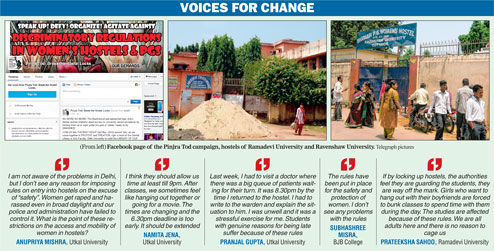
Bhubaneswar, April 5: In faraway California, seven-year-old Faith Lennox was recently fitted with a 3-D printed hand - an emerging technology revolutionising prosthetics. Closer home, a group of seven engineers has printed a similar arm using a three-dimensional (3-D) printer that they have developed.
The selfie-crazy people will definitely be happy to know that this cost-effective printer, which is armed with several innovative features, is also fitted with a camera that can scan a picture and make a copy of the same.
"You can take a 3-D selfie of yourself and get it printed here. Architects can use the printer to see how their designs look like in a real-life situation. An automobile designer can also have a prototype look using this device," said Dhiraj Choudhary, one of the team members.
Dhiraj, along with his friend Satya Prakash Singh, is running an innovation laboratory called Fabonix Technologies at Infocity at Patia.
Other members of the group are Harsh Wardhan Kumar, Anurag Kumar, Ashutosh Patra, Manjeet Kumar and Satish Kumar.
While Dhiraj is from Jamshedpur and Satya Prakash from Bokaro, there are others in the team who are also from Jharkhand. The rest are from Odisha. But all are BTech graduates from Biju Patnaik University of Technology. Their start-up, Fabonix, on the other hand, is listed under the technology business incubator of KIIT University.
While 3-D printers are available at Rs 65,000 and above in India, the one developed by Fabonix is priced at less than Rs 50,000. The same product with a foreign make may cost Rs 1.5 lakh or even more.
"The interesting part is that we have not copy-pasted any technology from other models developed by foreign companies. We have developed all the components here in our laboratory," said Satya Prakash.
The team has developed a myo-electric prosthetic bionic arm printed on their Sigma 3-D printer, which is priced at Rs 9,000. In the market, the same product is available at Rs 18,000 or more. Myo-electric prosthetic bionic arm is an artificial limb, which gets power harvested from the human body and based on the muscle sensors performs like a normal arm.
"We have included the muscle sensor in our own laboratory, purchased some common parts from the local Indian market and used soft gel type material coating to give it a human touch feel. Cost-wise it is like a Gandhian innovation as it comes at half the price than in the market," said Dhiraj.
Regarding multiple use of the 3-D printer, he said: "Those who are into designing new products or prototypes, parts or assembly machines can utilise our Sigma 3D printer to produce the prototypes and test their design and how they look, work and function. It not only reduces the cost of making a miniature model, but also saves time as well."
School students can also explore the 3-D printing world. Arts and crafts classes can have an extra option to judge students' creativity. While the 3-D printed models are sturdier than the traditional plastic models, chemistry students and teachers can take 3-D prints of molecular models to explain the subjects in a better way. Biology students can also use three-dimensional prints of skulls and other bones.
"Users such as architects, structural engineers, hobby centres, schools, colleges, engineering institutions, research and development centres, jewellers, fashion designers, artificial limb manufacturers and robotics students and researchers can benefit from the printer," said Dhiraj.










